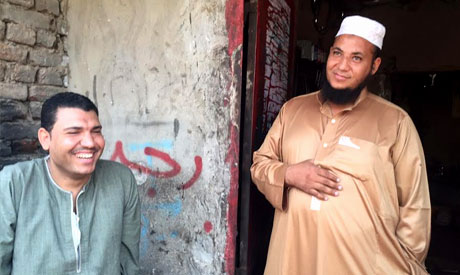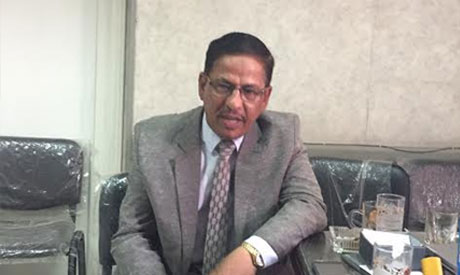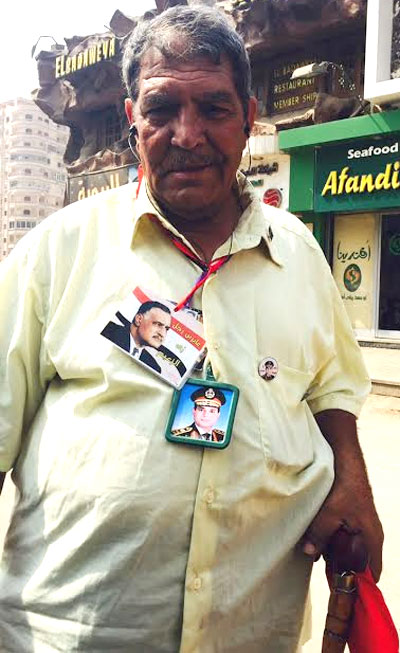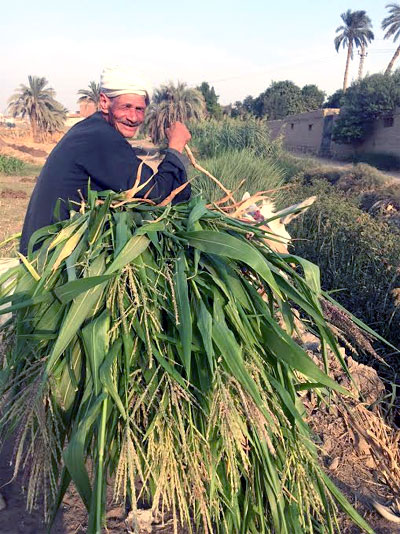In the Upper Egypt governorate of Fayoum, a 45 minute drive south from the capital Cairo, 131 candidates are contesting 21 seats in the individuals system across six constituencies.
Just short of three million citizens are eligible to vote in the governorate's 847 polling stations.
In the centre of Fayoum city there was a weak show of banners, posters and flyers promoting candidates. At the polling stations in the centre and in the city's two other constituencies, Atssah and Tamiyah, the show of voters was seemingly dismal.
Many people were going about their business; shopping for basic commodities, complaining about prices, haggling even on relatively cheap items like fruit and vegetables.
If they spoke of elections it was with mostly unmasked disinterest. Farmers were moving around their fields attending to their business –very few had any attention to leave their work and go vote.
“Well, I really don’t know any of the names running for this election — except those of the National Democratic Party (NDP),” said Nagatt, a housewife in her early 70s.
Naggat is planning not to bother. “I will not vote for them. I know who they are. I live here and I have known them all my life. They are not good people. They are not going to serve anyone or help anyone. They are offering hot meals today because they want people to vote for them,” she said.
As far as Naggat is concerned, there is nothing to gain or by voting. She lives with her elderly husband in a small house at the centre of Fayoum, having married off six girls and two boys.
“What will they do to us if we don’t vote? We don’t have the LE500 to pay in fine for not voting, as the TV has been warning,” she said.
“I am not sure what the point of this parliament is to start with. Will they reduce prices, will they provide services at the public hospital? What will they do? This is not for us - it is none of my business,” she stressed.
Naggat's disinterest is shared, but for different reasons, by other individuals who spoke to Ahram Online on Sunday in central Fayoum and the nearby areas of Kahafa and Dar El-Rammad, as well as in the villages of Atssah and Tammiyah.
Some are disinterested in parliament because their hopes lie with the president.
“We voted for El-Sisi and we put our faith in him and we expect him to fix things,” said Anwar, a 45-year-old mechanic from Atssa.
Others have different stories to tell.
“Why would I want to take part in this fake electoral process that is designed only to make the president, who came to power by removing an elected president, look legitimate?

Hani (L) (Photo: Dina Ezzat)
I am not party to this political process,” said Hani, a carpenter in his early 30s from Kahafah.
A large group of those ignoring the elections that kicked off in Fayoum on Sunday, the first of a two-phase process, are supporters of ousted president Mohamed Morsi, the Muslim Brotherhood senior who was removed from office in July 2013, just a year after being sworn in, amid mass protests against his rule.
“Well, ever since that day I lost faith in the democratic process. It is not just about the fact that Dr Morsi (a professor of engineering by profession) was unfairly removed, but about what has been happening since. We have been under tight security scrutiny and if anyone was to protest anything, be it the political process or the economic conditions, they would be taken by security officers and you would not know what would happen to them afterwards,” said Hussein, a plumber in his late 30s from Dar El-Rammad.

Tagammua runner Hassan Gaber (Photo: Dina Ezzat)
According to Hassan Gabr, an individual candidate running in the central constituency in Fayoum city, the main reason for the “large and extremely disturbing disinterest" in voting is "growing frustration."
Gabr is a member of the pro-Sisi left-wing Tagammu Party. He took part in the popular movement to oust the Muslim Brotherhood, who he calls “self-declared Islamists” in line with the term coined by leading Tagammu member Rifaat El-Said.
“I had anticipated this very low level of participation. I told the party leadership that the situation is very disappointing for many people, especially the inability of the government to do anything to help improve living conditions. The party decided it wanted to support the political process anyway,” he said.
Gabr is convinced, he told Ahram Online, that people's frustration is compounded by the fact that “candidates who clearly have the support of state bodies in Fayoum are former members of the NDP or former officials and officers in security bodies".
According to Gabr such candidates are mostly running on lists “supported by the government, like For the Love of Egypt”, while others are running independently having been "rejected by list coordinators”.
“People here may have no faith in the ability of the Muslim Brotherhood to run the country, but they also are very sceptical of any government's ability— no matter the prime minister — to improve their lives,” Gabr said.
He added, “I don’t want to say that some are already questioning the will and intentions of the political leadership, but I would say for now that the sense of hope, of optimism, that we had over a year ago is lost. People feel that we are back to the days of Mubarak."
Fayoum is one of the country's poorest governorates with more than 40 percent of its population living under the official poverty line. The governorate suffers serious under-development in its overall infrastructure.
Fayoum is a Muslim Brotherhood stronghold and was one of the top supporting voting blocs for candidates of the political arm of the Muslim Brotherhood, the Freedom and Justice Party, and their presidential candidate in the summer of 2012 – Mohamed Morsi.
Since Morsi's ouster, Fayoum winessed violent face-offs between security forces and anti-government Islamists.
"With such levels of poverty and layers of corruption and nepotism that we suffer from, as a result of the policies of the NDP [during the Mubarak years], Fayoum has leaned hard towards the Muslim Brotherhood. The NDP created poverty and the Muslim Brotherhood used this situation to lobby supporters," Gabr added.
Today, Gabr says, the fight is still on as it was in 2010, "between the NDP, whose members want to come back under any other name, and the Muslim Brotherhood, whose influence in Fayoum cannot be underestimated given their social networks across the governorate".
Gabr claims the Muslim Brotherhood has been lobbying people against taking part in the electoral process.
“They are not running any candidates or voting for anyone, and to be honest the Islamists are generally absent from the elections because the candidate of the [pro-Sisi] Salafist Al-Nour Party lacks a large following here,” he said.
“The [Brotherhood] know what they are doing. They are deliberately discrediting the elections to embarrass the president. And I am afraid that there is not much to be done about it,” Gabr lamented.
Indeed, electoral booths were practically empty throughout most parts of the centre and neighbouring districts of Fayoum on Sunday morning.
"Well, as you can see for yourself, there is hardly anyone who has come to vote,” said one supervisor at a key ballot station.
At 1:30pm she had only seen 15 people cast their votes. “Maybe in the afternoon or the evening we will get more people to vote —maybe. We are here waiting,” she said.

Malak, a 43-year-old carpenter from Kahafah (Photo: Dina Ezzat)
Of the few people who were keen to vote in the morning of Sunday, Malak, a 43-year-old carpenter, from Kahafah said that he was not sure who he voted for.
Malak voted for the pro-Sisi “For the Love of Egypt” electoral list because he “was told that they are good people.”
“I don’t know most of them. The ones I know are former members of the NDP, but the rest I don’t know.”
Who told him to vote for "For the Love of Egypt"? He smiles and looks away before saying: “Well, you know ... You must know ... At the church and so on.”
Malak argued that he just did not want the Muslim Brotherhood to come back.
“I voted for El-Sisi and I am now voting for the people I am told are with him. It makes sense, right?”

Abdel-Aziz (Photo: Dina Ezzat)
Abdel-Aziz, a recently retired civil servant from the constituency of Sinoras was also determined to vote for “any pro-Sisi” list or candidates.
“I really don’t know anyone and I am not sure how many candidates or lists I should pick but I would go and ask those who work at the electoral district – they are with the government and they should know,” Abdel-Aziz said.
For the most part, those who seemed determined to vote were doing so in the hope that the future MPs will attend to living conditions.
Abdel-Aziz was hoping for better irrigation and sewage services.

Rabie, a farmer in his late 50s from Tamiyah (Photo: Dina Ezzat)
Rabie, a farmer in his late 50s from Tamiyah, was also hoping for better services: irrigation – “which is really a big problem now”, sewage, water, health and electricity.
Rabie also hoped the MPs he was planning to vote for on Monday can provide farmers with pensions in case of illness that prohibits them from work.
“I think I will go vote tomorrow. I am not sure, but I will try to find the time. I was very busy with the field today - tomorrow is another day, if I can make the time,” Rabie said as the sun set on his field.
Short link: